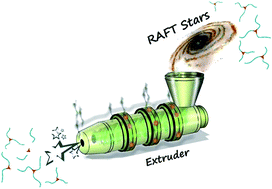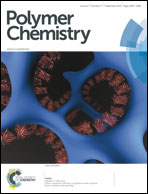Stability of star-shaped RAFT polystyrenes under mechanical and thermal stress†
Abstract
Well-defined three-arm and four-arm star polymers designed via a Z-group approach carrying trithiocarbonate functionalities at the core are prepared via reversible addition-fragmentation chain transfer (RAFT) polymerization featuring molecular weights of Mn,SEC = 156 kDa, Đ = 1.16 (3-arm) and Mn,SEC = 162 kDa, Đ = 1.15 (4-arm) based on multi-angle laser light scattering (MALLS) detection, respectively. The star-shaped polystyrenes are subjected (in bulk) to thermal stress in the temperature range between 140 and 200 °C from 10 minutes up to 96 h. The thermally treated 3-arm and 4-arm star polymers are analyzed via size exclusion chromatography (SEC) to quantify the degradation process at variable temperatures as a function of time under an argon atmosphere. Cleavage rate coefficients of the star polymers are deduced as a function of temperature, resulting in activation parameters for the cleavage process, i.e. Ea = 131 kJ mol−1; A = 3.93 × 1011 s−1 (Mn,SEC = 156 kDa, Đ = 1.16, 3-arm star) and Ea, = 134 kJ mol−1; A = 9.13 × 1011 s−1 (Mn,SEC = 162 kDa, Đ = 1.15, 4-arm star), respectively. Processing of the star-shaped polymers is mimicked via a small scale counter rotating twin screw extrusion to achieve nonlinear shear and elongation flow under pressure. Furthermore, a rheological assessment via the linear shear deformation region (small amplitude oscillatory shear, SAOS) allows for a correlation of the processing conditions with the thermal degradation properties of the star polymers in the melt. Zero shear viscosity (η0) as a criterion of the degradation process is measured in the rheometer and correlated to the weight-average molecular weight, Mw.


 Please wait while we load your content...
Please wait while we load your content...